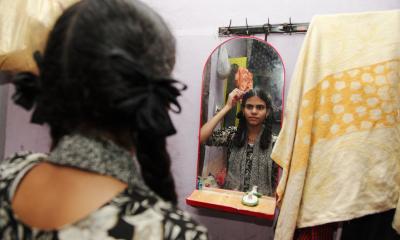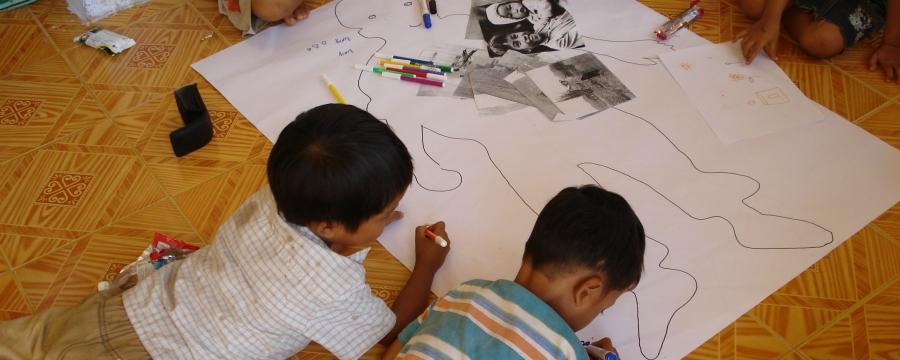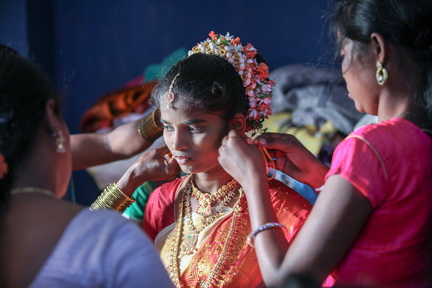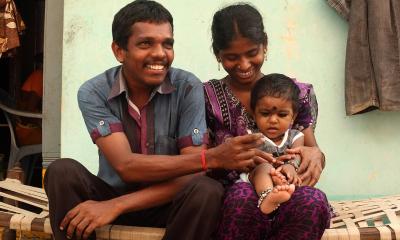
One of the strengths of Young Lives is its mixed-methods design that captures both breadth and depth of data on children’s changing lives and contexts. Our qualitative research takes a hybrid approach, combining qualitative longitudinal inquiry with one-off sub-studies, as an integrated part of Young Lives wider research programme.
The qualitative longitudinal stream of research began following a sub-set of over 200 children across the four study countries in 2007, involving their caregivers, peers, service providers and other community members. The nested case studies were drawn from the survey to achieve an even spread of boys and girls across both age cohorts, selected from households in rural, urban and different regional settings, and from a range of social and economic backgrounds.
The qualitative longitudinal research entails returning every few years to the same sample of participants, following up on changes in their lives and circumstances.
Ages of children at each round of qualitative data collection:
| Younger Cohort. | Older Cohort. | |
|---|---|---|
| Round 1 (2007) | age 5-6 | age 12-13 |
| Round 2 (2008) | age 6-7 | age 13-14 |
| Round 3 (2010-11) | age 9-10 | age 16-17 |
| Round 4 (2014) | age 12-13 | age 19-20 |
| Round 5 (2019) Ethiopia only. | age 18-19 | age 25-26 |
We capture experiences in early childhood through to early adulthood, including transitions from school to work, and as young people marry and become parents.

Through this research we have been documenting and analysing participants’ detailed narrative accounts, reflecting on their childhoods (past, present and future), including their perspectives on what has contributed to shaping their situations, trajectories and well-being, their aspirations and goals, as well as realistic expectations for future outcomes.
This style of inquiry is ideal for enriching understanding of the way children and youth in different circumstances navigate choices, risks, opportunities, relationships and life transitions, across time.
Our lines of questioning reflect a whole-person approach so cut-across all four/five Young Lives research themes. Broadly, we want to know:
- How do choices, decisions and actions influence life trajectories from childhood through to early adulthood?
- What are the environmental and social factors that influence young people’s trajectories?
- What are the factors that prevent or support young people in pursuing the lives and futures that they value?
In each wave of data collection, we adapt and refine our questions to reflect the ages of young people, new debates and insights from research, and policy developments, globally and in the places where we work.
We also adapt our methods, depending on the topic, and on the age, capacities and interests of the participants. We combine semi-structured interviews with focus group discussions, and when the participants were younger, we developed a range of creative tools, such as drawing, mapping, photography and mobile methods, to guide and stimulate conversations. The repeat biographical interview is instrumental in the qualitative longitudinal research to systemically record information about children’s lives at different points in time. From the beginning, we interviewed the young person and their caregiver/parent, and as young people grew older and their living situations and relationships changed, we began to involve their spouses, where possible.

In addition to our qualitative longitudinal research, we have carried out a number of discrete qualitative sub-studies, on specific topics of interest, involving Young Lives participants. Sub-studies can be undertaken in one or more of the countries, and often reflect a specific policy issue. We have investigated a wide range of topics, always through the experiences of children and young people, including their experiences of violence, parental death, child work, urban relocation, disability and education, social protection programmes (PSNP in Ethiopia and MGNREGA in India), and underage marriage and early childbearing.
Combining the sub-study approach with the longitudinal approach means we can determine which sample of young people and of communities is most suitable for exploring specific research questions. Maintaining the longitudinal sample offers valuable insights into the factors and mechanisms that explain the twists and turns in children’s lives and what explains their diverging trajectories across the early life course.
We endeavour to work collaboratively through research partnerships involving Young Lives Oxford and researchers located in each of the four study countries. Oxford coordinates the research and oversees the comparative design, while lead country researchers are responsible for generating and cleaning the data and for maintaining the relationships with the participants; qualitative researchers in the study countries and Oxford analyse the data and publish and co-author qualitative and mixed-methods papers and reports.
The data from our qualitative research are not shared nor put into a public archive because of concerns about confidentiality. If you have questions, please contact us on younglives@qeh.ox.ac.uk
Key insights from the qualitative data can be found in our collection of children’s perspectives, Towards a Better Future? and Hopes and Fears from Young Lives.
One of the strengths of Young Lives is its mixed-methods design that captures both breadth and depth of data on children’s changing lives and contexts. Our qualitative research takes a hybrid approach, combining qualitative longitudinal inquiry with one-off sub-studies, as an integrated part of Young Lives wider research programme.
The qualitative longitudinal stream of research began following a sub-set of over 200 children across the four study countries in 2007, involving their caregivers, peers, service providers and other community members. The nested case studies were drawn from the survey to achieve an even spread of boys and girls across both age cohorts, selected from households in rural, urban and different regional settings, and from a range of social and economic backgrounds.
The qualitative longitudinal research entails returning every few years to the same sample of participants, following up on changes in their lives and circumstances.
Ages of children at each round of qualitative data collection:
| Younger Cohort. | Older Cohort. | |
|---|---|---|
| Round 1 (2007) | age 5-6 | age 12-13 |
| Round 2 (2008) | age 6-7 | age 13-14 |
| Round 3 (2010-11) | age 9-10 | age 16-17 |
| Round 4 (2014) | age 12-13 | age 19-20 |
| Round 5 (2019) Ethiopia only. | age 18-19 | age 25-26 |
We capture experiences in early childhood through to early adulthood, including transitions from school to work, and as young people marry and become parents.

Through this research we have been documenting and analysing participants’ detailed narrative accounts, reflecting on their childhoods (past, present and future), including their perspectives on what has contributed to shaping their situations, trajectories and well-being, their aspirations and goals, as well as realistic expectations for future outcomes.
This style of inquiry is ideal for enriching understanding of the way children and youth in different circumstances navigate choices, risks, opportunities, relationships and life transitions, across time.
Our lines of questioning reflect a whole-person approach so cut-across all four/five Young Lives research themes. Broadly, we want to know:
- How do choices, decisions and actions influence life trajectories from childhood through to early adulthood?
- What are the environmental and social factors that influence young people’s trajectories?
- What are the factors that prevent or support young people in pursuing the lives and futures that they value?
In each wave of data collection, we adapt and refine our questions to reflect the ages of young people, new debates and insights from research, and policy developments, globally and in the places where we work.
We also adapt our methods, depending on the topic, and on the age, capacities and interests of the participants. We combine semi-structured interviews with focus group discussions, and when the participants were younger, we developed a range of creative tools, such as drawing, mapping, photography and mobile methods, to guide and stimulate conversations. The repeat biographical interview is instrumental in the qualitative longitudinal research to systemically record information about children’s lives at different points in time. From the beginning, we interviewed the young person and their caregiver/parent, and as young people grew older and their living situations and relationships changed, we began to involve their spouses, where possible.

In addition to our qualitative longitudinal research, we have carried out a number of discrete qualitative sub-studies, on specific topics of interest, involving Young Lives participants. Sub-studies can be undertaken in one or more of the countries, and often reflect a specific policy issue. We have investigated a wide range of topics, always through the experiences of children and young people, including their experiences of violence, parental death, child work, urban relocation, disability and education, social protection programmes (PSNP in Ethiopia and MGNREGA in India), and underage marriage and early childbearing.
Combining the sub-study approach with the longitudinal approach means we can determine which sample of young people and of communities is most suitable for exploring specific research questions. Maintaining the longitudinal sample offers valuable insights into the factors and mechanisms that explain the twists and turns in children’s lives and what explains their diverging trajectories across the early life course.
We endeavour to work collaboratively through research partnerships involving Young Lives Oxford and researchers located in each of the four study countries. Oxford coordinates the research and oversees the comparative design, while lead country researchers are responsible for generating and cleaning the data and for maintaining the relationships with the participants; qualitative researchers in the study countries and Oxford analyse the data and publish and co-author qualitative and mixed-methods papers and reports.
The data from our qualitative research are not shared nor put into a public archive because of concerns about confidentiality. If you have questions, please contact us on younglives@qeh.ox.ac.uk
Key insights from the qualitative data can be found in our collection of children’s perspectives, Towards a Better Future? and Hopes and Fears from Young Lives.





